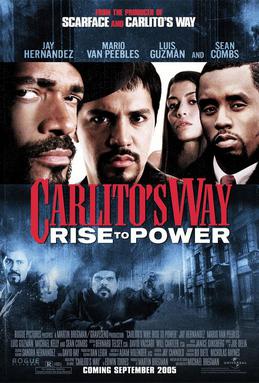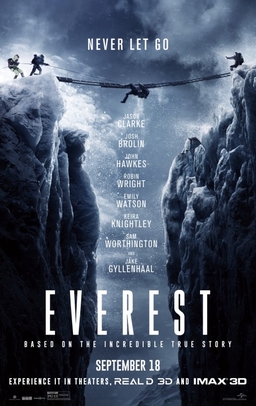After you watched Carlito’s Way, you may have asked yourself, “Gee, I wonder how Carlito came to power in the first place? I wonder what he was like when he was young….”
Now, keep in mind, you may have asked yourself that. I did not ask myself that. To be honest, I didn’t really care. Carlito’s Way pretty much told me everything that I needed to know about Carlito’s past. Just the fact that people on the street respected him as soon as he got out of prison and that everyone was trying to get him to restart his life of crime told me that Carlito was obviously a big deal in the past. So, I didn’t really need a prequel.
But, obviously, the people behind the 2005 film, Carlito’s Way: Rise to Power, disagreed. I guess I can understand their logic. When you’ve got a hit film, it’s only natural to try to do a follow-up. And when the first film ends with the main character dying, you really don’t have much choice but to do a prequel. And let’s give credit where credit is due. Long before the movies were made, Carlito Brigante was the main character of two novels written by Edwin Torres. Carlito’s Way: Rise To Power is based on the first of those novels and Torres reportedly said that he appreciated that the prequel stuck close to what he had written. So, it’s not like they just made up this film’s plot out of thin air.
That said, it’s still not a very good film. It takes place in the 60s, with young Carlito (Jay Hernandez) working his way up the ladder in New York’s drug chain. His partners, who he met in jail, are Earl (Mario Van Peebles) and Rocco (Michael Kelly). When they’re release from jail, they find themselves in the middle of drug war between Hollywood Nicky (Sean Combs) and the Bottolota Family, led by Artie (Burt Young). The three friends play the two sides against each other while also dealing with all of the usual betrayals and random violence that one normally expects to find in a movie like this. Luis Guzman shows up, playing a coke-snorting hitman named Nacho. It’s a bit disconcerting since Guzman played a different character in Carlito’s Way but it’s still always good to see Luis Guzman.
Anyway, the main problem with Carlito’s Way: Rise to Power can be seen in the casting of the main characters. Carlito’s Way had Al Pacino, Sean Penn, and John Leguizamo. Rise To Power has Jay Hernandez and Mario Van Peebles. Whatever gritty authenticity the film may be aiming for vanishes as soon as Mario Van Peebles looks straight at camera and smiles at his reflection. As for Jay Hernandez, he’s a likable actor but he’s the exact opposite of intimidating. You’d probably say yes if he asked you to prom but he does’t exactly come across like someone who could take over the New York drug racket. When Sean Combs is the most dangerous person in your movie, you’re looking at trouble.
Director Michael Bregman attempts to imitate a bit of Brian De Palma’s style from the first film and Jay Hernandez does his best to sound Pacino-like in his voice-over narration but the end result is flat and predictable. This is an offer that you can refuse.
Previous Offers You Can’t (or Can) Refuse:
- The Public Enemy
- Scarface (1932)
- The Purple Gang
- The Gang That Could’t Shoot Straight
- The Happening
- King of the Roaring Twenties: The Story of Arnold Rothstein
- The Roaring Twenties
- Force of Evil
- Rob the Mob
- Gambling House
- Race Street
- Racket Girls
- Hoffa
- Contraband
- Bugsy Malone
- Love Me or Leave Me
- Murder, Inc.
- The St. Valentine’s Day Massacre
- Scarface (1983)
- The Untouchables
- Carlito’s Way



